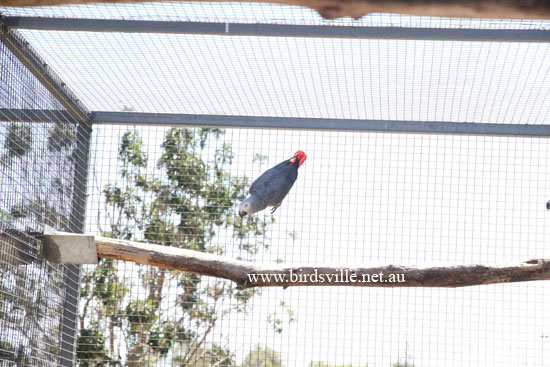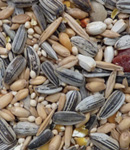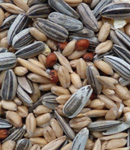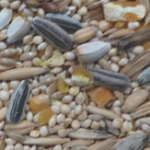African Grey Parrot care.

African Grey parrots are famous for their amazing talking ability. These birds are able to remember and mimic hundreds of words. I was surprised with one African Grey Parrot we had in store that not only spoke beautifully, but also mimicked local birds from where it grew up in the Blue Mountains; such as Currawongs and Bell Birds – and did so with perfect clarity. Like most parrots they usually don’t start talking untill they reach at least 9 months of age. Although i have seem some talking as early as 4 months old.
Pros and Cons about African Grey parrots
i already mentioned the pros above, Ive seen and owned some birds that are absolutely fantastic and some birds that are not, one thing i wouldn’t recommend this type of bird with children as when they get past 12 months old they do have a tendency to become quite aggressive especially the males. African greys are not all good talkers i have had one grey that wouldn’t talk at all and have sold some that would only say a few words. Where i have never come across an amazon parrot that doesn’t talk.
Availability of Grey parrots at Birdsville
These are not common but are sparsely available all year round. If you are interested in Owning one of these beautiful birds call us or visit us for a chat at birdsville.
Distribution and Habitat of grey parrot’s
Just like the name suggests these parrots are from Africa ranging from Angola to the ivory coast, inland from Kenya to Tanzania. In the wild they may be found in rainforests, wooded savannahs, cultivated land and mangroves.
Cage’s FOR Congo African Grey’s
African Grey Parrots are large parrots and require a large cage for many toys, perches, food/water dishes, as well as sufficient space for them to move around and spread their wings. This eliminates boredom while caged.
Toys are very important for entertainment; choose thing that will make them think, things they can chew and destroy and some strong durable toys for longevity.
Don’t be afraid to take them out of the cage and simply spend time with them, as this will result in a much happier bird. African Greys need to have plenty of time daily outside their cage as well. It would be a good idea to look into a specially designated play area that provides them a change of scenery from their cage or a stand that can be moved around the house as the family moves. Any play area must be baby proofed. They will go after your power cords; they will chew your wooden furniture and anything that is within their grasp.
Cages, toys, stands and everything you need for you macaws are available at Birdsville.
Toys And Fun For Your Tame African Grey
Toys are used as a form of environmental enrichment but enrichment shouldnt stop there. As an ex zoo keeper it was a major concern that all animals must have a variety environmental enrichments to keep the critters entertained. This is in no way different for anyone who has a tame parrot at home. Enrichment is important because parrots simply can not thrive with only perches, food and water. The fact is birds provided with enrichment are unlikely to develope psychological problems such as self mutilation, feather plucking and excessive squarking. Enrichment WILL in fact effect your bird in a positive way with its mental and physical development when training your bird you will actually end up with a better, less fearful, friendlier and relaxed bird which will be more easily trained. Enrichment can be chew toys, play toys, leather toys, acrylic plastic toys, wooden toys, shredding toys, ropes, swings, ladders, bells, balls, birdie balls, plain card board,small boxes, wicker baskets, tray of wheat grass, plants, bird baths,different foods, food kabobs, nuts, (all available at birdsville) You may also find in your local area pine cones, hide food inside pine cones, twigs, bendy branches, flowers and branches- safe flowers are bottle brush, grevellia, eucalypt melaleuca flowers, hubiscus, marygolds, dandy lions leaves and all, roses, violets to name a few.
Note anything found outside should be disinfected and non poisonouse and toys must be non toxic.
Enrichment tip- the trick to keeping them entertained is regularly rotating toys as they will become bored with the same toy in there cage day after day. Changing them regularly will create interest for your bird as if they are receiving a whole new toy to play with.
Diet for African grey parrots
There are specially formulated pellet diet made particularly for African Greys I feed my african grey breeding pair Kaytee pellets but tropican, vetafarm or roudy bush pellets are great too. Which should make up half their diet. The rest should be made up of 25% of good quality seed mix and 25% of fresh fruit and vegetables. It is also a great idea in addition to this diet to add vitamins and calcium in powder form to their water. With all of this your African Grey should be in perfect health! These are savannah birds and as a grey owner they should never be completely taken off seed as this in a natural part of there diet
Introducing your grey to existing birds
Once you take your bird home you should keep it in a separate cage and allow the bird to adjust accordingly. Always allow at least 2 weeks before introducing the bird to an existing bird. I have kept african grey parrots with eclectus parrots and they got along well but every bird is different so be wary when mixing birds.
Worming- have you wormed your bird?
Your new African Grey Parrot will need to be wormed in a few weeks to two month after being taken home (check with the stafffrom Birdsville, when purchasing). Worming will need to be done every 6 month to ensure your bird stays healthy.
Lice & Mites
These are the two most common parasites that may affect your Grey and their environment, but are easily controlled with a Mite and Lice spray, available at Birdsville. When using spray, spray bird, entire cage, perches and toys, remember to remove all water and feed and avoid spraying in birds’ eyes.
Training african greys
This is an important factor of having a well behaved hand raised bird. When you get your Grey home, it will need to be handle in a quiet, relaxed situation, but don’t over stress it in the first few weeks of taking it home. The more time you spend with your Grey, the better your bird will become. For more infomation go to the training your bird page.





